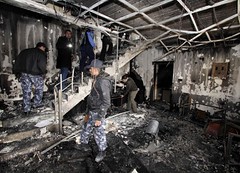
Security forces inspect a destroyed television station in Sulaimaniyah, 260 kilometers (160 miles) northeast of Baghdad, Iraq, Sunday, Feb. 20, 2011. Gunmen burst into a Kurdish television station in northern Iraq on Sunday, shooting up the equipment.
Originally uploaded by Pan-African News Wire File Photos
At least six protesters killed by security forces, amid nationwide "day of rage" against corruption and poor services
Last Modified: 25 Feb 2011 14:46 GMT
The demands of protesters include basic services and the replacement of corrupt local officials
Thousands of Iraqis have taken to the streets across the country to protest against corruption and a lack of basic services in an organised nationwide "day of rage", inspired by uprisings around the Arab world.
In two northern Iraqi cities, security forces trying to push back crowds opened fire on Friday, killing six demonstrators.
In Baghdad, the capital, demonstrators knocked down blast walls, threw rocks and scuffled with club-wielding troops.
Hundreds of people carrying Iraqi flags and banners streamed into Baghdad's Tahrir Square, which was under heavy security.
Military vehicles and security forces lined the streets around the square and nearby Jumhuriya bridge was blocked off.
Al Jazeera's Jane Arraf, reporting from Baghdad, said there was a violent standoff between the protesters and the riot police on the bridge that leads to the heavily fortified Green Zone.
Ahmed Rushdi, head of the House of Iraq Expertise Foundation, tried to join the protests in Baghdad but was prevented from doing so by the army.
"This is not a political protest, but a protest by the people of Iraq. We want social reform, jobs for young people and direct supervision because there is lots of corruption," Rushdi told Al Jazeera.
"If [prime minister Nuri] al-Maliki does not listen, we will continue this protest. He told everyone that we are Sadamists, but that is not right. We are normal Iraqi people."
Eight years after the US-led invasion which ousted Saddam Hussein, the former Iraqi leader, development in the country remains slow and there are shortages of food, water, electricity and jobs.
Protesters confirmed that they were protesting for a better life and better basic services.
"We are free young men and we are not belonging to a certain ideological movement but we ask for our simple legitimate demands that include the right of education and the right of decent life,” Malik Abdon, a protester, said.
'Al-Qaeda threat'
The Arab world has erupted in protests seeking to oust long-standing rulers and improve basic services, although Iraqi demonstrations have been more focused on anger over a lack of essential needs and an end to corruption rather than a change in government.
Protesters have demonstrated throughout Iraq, from the northern city of Kirkuk to the southern oil hub of Basra.
A crowd of angry marchers in the northern city of Hawija, 240km north of Baghdad, tried to break into the city's municipal building, Ali Hussein Salih, the head of the local city council, said.
Security forces trying to block the crowd opened fire, killing three demonstrators and wounding 15, local officials said.
The Iraqi army was eventually called in to restore order.
In Mosul, also in northern Iraq, hundreds of protesters gathered in front of the provincial council building, demanding jobs and better services, when guards opened fire, according to a police official.
A police and hospital official said three protesters were killed and 15 people wounded. The officials spoke on condition of anonymity because they are not authorised to brief the media.
Friday's protests were organised mainly through social networking site Facebook, echoing mass rallies mobilised by youths through social media which unseated Tunisia and Egypt's long-ruling heads of state.
In recent weeks, protests had been mounting in cities and towns around Iraq. Several people have been killed and scores wounded in clashes between demonstrators and security forces.
Al-Maliki, the prime minister, has affirmed the right of Iraqis to protest peacefully but on Thursday he advised them to stay away from Friday's demonstration due to possible violence by al-Qaeda and members of Saddam's banned Baath party.
A weakened but stubborn campaign of violence by fighters is still capable of carrying out large-scale attacks in Iraq despite a big drop in overall violence since the peak of sectarian warfare in 2006-7.
Shia clerics, including revered Grand Ayatollah Ali al-Sistani and Moqtada al-Sadr, had also cautioned their followers about taking part in the protests on Friday.
Source: Al Jazeera and agencies
No comments:
Post a Comment